Foreigners coming to Japan often find the country’s garbage sorting and disposal system to be a significant challenge. In many of our home countries, garbage disposal might not involve sorting at all. All waste goes into a single bin with no specific collection days – you dispose of it whenever you please. When visiting Japan as a tourist for a short duration, you might not generate a substantial amount of trash. However, if you’re coming to Japan for studies or work, your daily activities will inevitably produce a considerable amount of waste over time. Hence, it’s crucial to understand Japan’s garbage sorting methods and the fundamental rules for garbage disposal.
Garbage Sorting Methods
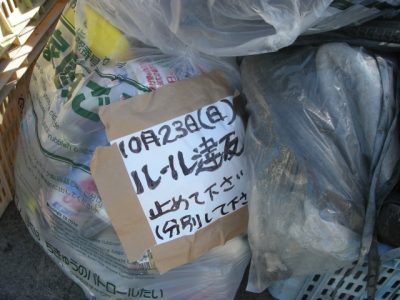
Burnable, Non-burnable, and Resource Waste
In daily life, the general categories for household waste in Japan are burnable, non-burnable, and resource waste. Some regions in Japan might have more detailed distinctions. For instance, within resource waste, items like cardboard, newspapers, and old books are categorized as old paper, while paper bags, gift boxes, wrapping paper, and envelopes fall into the category of other paper.
Here is an example of specific classification methods, but please note that this example might not apply to all areas in Japan. Some areas classify textiles and clothing as burnable waste, while others classify them as resource waste. The collection times for different types of waste can vary, and improper sorting might lead to your trash being rejected with a warning sticker. It’s essential to refer to your local area’s official website for precise garbage sorting rules.
Japan Pocket Wifi Rental
UNLIMTED DATA SIM CARD
Japan Travel Prepaid SIM card
| General Rules for Garbage Sorting | |
|---|---|
| Burnable Waste | Food waste, general waste, paper scraps, leather, etc. |
| Non-burnable Waste | Metal, glass, ceramics, etc. |
| Resource Waste | Recyclable plastic bottles, glass bottles, metal cans, newspapers, cardboard, etc. |
| Bulky Waste | Large furniture, except electronics (see below) |
Bulky Waste
Bulky waste, also known as oversized waste, refers to large items such as furniture with edges exceeding a specific size. The definition of bulky waste may vary from one region to another. For instance, some areas might consider items with edges longer than 30 cm as bulky waste, while others might set the limit at 40 cm.
Generally, oversized wooden wardrobes, tables and chairs, bicycles, beds and mattresses, sofas, and larger carpets fall under bulky waste.
To dispose of bulky waste, you need to make advance reservations with your local bulky waste disposal center. Additionally, there’s a fee associated with this disposal. In some areas, the cost is specified for each item (e.g., a single-seat sofa might cost 400 yen, while a double-seat sofa is 1200 yen), whereas in other areas, all bulky waste items are charged a flat rate of 500 yen each. Some regions may require the purchase of bulky waste disposal vouchers in advance, and these vouchers must be attached to the bulky waste and dropped off at the designated location at specific times.
It’s important to note that washing machines, refrigerators, clothes dryers, printers, home computers, etc., although they have edges longer than the defined dimensions, cannot be treated as bulky waste due to being household appliances.
Large Appliances like Washing Machines and Refrigerators
According to Japan’s Home Appliance Recycling Law, household appliances should not be disposed of as regular trash when they’re discarded, even if you’re willing to pay for bulky waste disposal.
When getting rid of old household appliances, you must contact the appliance’s retailer, and they will arrange proper recycling and reuse. This service generally comes at a cost.
Some businesses may offer to handle the disposal of your old appliances for free when you purchase new ones. If you’re planning to replace old household appliances, consider looking for such retailers.
When and Where to Dispose of Garbage?
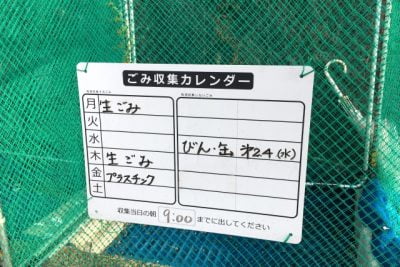
Divided by Days of the Week
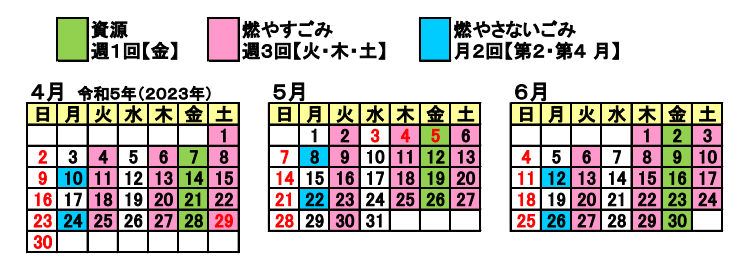
Taking Tokyo as an example, garbage disposal times are typically consistent each week, with specific days assigned for disposing of different types of waste.
For example, as shown in the image above, you can dispose of general waste and burnable trash on every Tuesday, Thursday, and Saturday. Fridays are designated for resource waste, and non-burnable waste is only collected on the second and fourth Mondays of the month.
However, the garbage collection schedule can differ outside of Tokyo. In some areas, you might be allowed to dispose of burnable waste only once a week and resource and non-burnable waste once a month.
It’s important to note that while the garbage sorting rules are generally the same within a particular ward or city in Tokyo, the garbage collection times may not be universally unified. Even within one ward of Tokyo, different streets and neighborhoods might have varying schedules. Residents are encouraged to visit their local government’s website to find specific information on waste categorization and collection times. Some areas with a substantial foreign resident population may provide a multilingual garbage sorting and disposal schedule, which you can keep for reference.
Garbage Disposal Locations
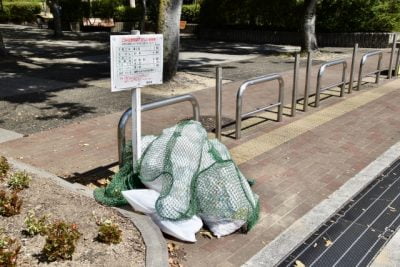
For regular apartments and single-family homes, you will typically find a garbage collection point not far from the building. At this collection point, you’ll see a sign that clearly outlines what type of garbage can be disposed of when. Under the sign, there will be green or blue nets for placing your garbage bags. There will also be various colored plastic bins (e.g., yellow, orange, blue) for recyclable plastic bottles, glass bottles, metal cans, non-burnable waste, etc. You should place the corresponding type of garbage in the bin of the matching color. When it’s not the designated time for waste collection, these bins are stacked to the side, and they are only arranged in a row during the specific waste collection hours.
Convenience in High-rise Apartments
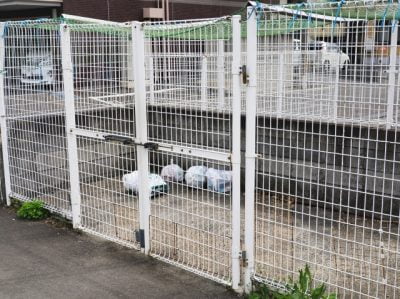
In Japan, some high-end apartments are equipped with a small garbage room downstairs. These rooms contain multiple containers for burnable waste, non-burnable waste, resource waste, recyclable plastic bottles, glass bottles, metal cans, etc., and the room’s door can be opened and closed at any time.
Residents in such apartments aren’t limited by specific garbage collection hours; they can dispose of their garbage 24 hours a day. During the summer, leaving garbage out overnight might cause unpleasant odors and attract insects, making these 24-hour garbage rooms highly convenient. Of course, the rent for such apartments may be higher, but the convenience justifies the cost.
These apartments are often listed with descriptions such as “24時間ゴミ出し可” (24-hour garbage disposal available). If you find such a listing at a reasonable price, it’s a wise choice to make a reservation.
Be Aware of Different Rules When Moving
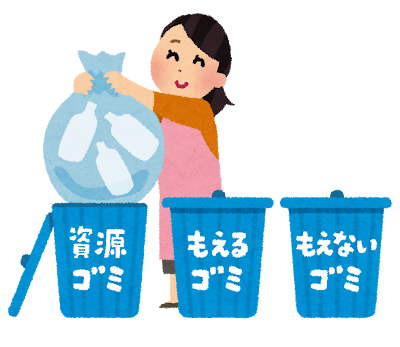
While garbage sorting is required nationwide in Japan, the rules for garbage sorting aren’t uniform across the country. If you’re moving from one area to another, even if it’s just from one street in Shinjuku to another, you need to recheck the local garbage sorting rules and waste collection schedule.
If you’re moving across districts or even across cities and prefectures, the rules for garbage sorting might change significantly.
First, the times for disposing of garbage might change. For example, in your previous location, you might have been allowed to dispose of burnable trash three times a week, but after moving, it could be limited to two times a week.
Some areas might even specify the color of garbage bags. For instance, burnable trash may need to be in white semi-transparent plastic bags, while certain types of recyclables require the use of clear plastic bags. In some areas, you may need to purchase designated garbage bags, and it’s mandatory to use these for disposal; you can’t use your own bags. Therefore, it’s crucial to check whether the garbage disposal rules have changed in your new location after moving.
Currently, Tokyo’s 23 wards don’t specify garbage bags. However, in places like Chofu City and Machida City, also in Tokyo Prefecture, you are required to purchase designated garbage bags. Moreover, in western Japan, regions in Kansai and Kyushu have started to introduce the specification of garbage bags in more and more areas.
Japan Pocket Wifi Rental
UNLIMTED DATA SIM CARD
Japan Travel Prepaid SIM card
